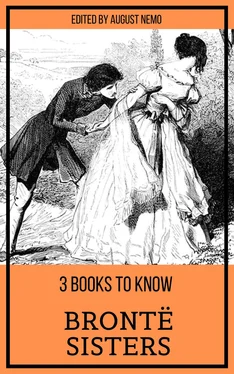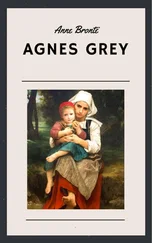‘Very good, if you please. We shall see who will tire first, my lady.’
‘If I tire, it will be of living in the world with you: not of living without your mockery of love. When you tire of your sinful ways, and show yourself truly repentant, I will forgive you, and, perhaps, try to love you again, though that will be hard indeed.’
‘Humph! and meantime you will go and talk me over to Mrs. Hargrave, and write long letters to aunt Maxwell to complain of the wicked wretch you have married?’
‘I shall complain to no one. Hitherto I have struggled hard to hide your vices from every eye, and invest you with virtues you never possessed; but now you must look to yourself.’
I left him muttering bad language to himself, and went up-stairs.
‘You are poorly, ma’am,’ said Rachel, surveying me with deep anxiety.
‘It is too true, Rachel,’ said I, answering her sad looks rather than her words.
‘I knew it, or I wouldn’t have mentioned such a thing.’
‘But don’t you trouble yourself about it,’ said I, kissing her pale, time-wasted cheek. ‘I can bear it better than you imagine.’
‘Yes, you were always for “bearing.” But if I was you I wouldn’t bear it; I’d give way to it, and cry right hard! and I’d talk too, I just would—I’d let him know what it was to—’
‘I have talked,’ said I; ‘I’ve said enough.’
‘Then I’d cry,’ persisted she. ‘I wouldn’t look so white and so calm, and burst my heart with keeping it in.’
‘I have cried,’ said I, smiling, in spite of my misery; ‘and I am calm now, really: so don’t discompose me again, nurse: let us say no more about it, and don’t mention it to the servants. There, you may go now. Good-night; and don’t disturb your rest for me: I shall sleep well—if I can.’
Notwithstanding this resolution, I found my bed so intolerable that, before two o’clock, I rose, and lighting my candle by the rushlight that was still burning, I got my desk and sat down in my dressing-gown to recount the events of the past evening. It was better to be so occupied than to be lying in bed torturing my brain with recollections of the far past and anticipations of the dreadful future. I have found relief in describing the very circumstances that have destroyed my peace, as well as the little trivial details attendant upon their discovery. No sleep I could have got this night would have done so much towards composing my mind, and preparing me to meet the trials of the day. I fancy so, at least; and yet, when I cease writing, I find my head aches terribly; and when I look into the glass, I am startled at my haggard, worn appearance.
Rachel has been to dress me, and says I have had a sad night of it, she can see. Milicent has just looked in to ask me how I was. I told her I was better, but to excuse my appearance admitted I had had a restless night. I wish this day were over! I shudder at the thoughts of going down to breakfast. How shall I encounter them all? Yet let me remember it is not I that am guilty: I have no cause to fear; and if they scorn me as a victim of their guilt, I can pity their folly and despise their scorn.
––––––––

EVENING.—BREAKFAST passed well over: I was calm and cool throughout. I answered composedly all inquiries respecting my health; and whatever was unusual in my look or manner was generally attributed to the trifling indisposition that had occasioned my early retirement last night. But how am I to get over the ten or twelve days that must yet elapse before they go? Yet why so long for their departure? When they are gone, how shall I get through the months or years of my future life in company with that man—my greatest enemy? for none could injure me as he has done. Oh! when I think how fondly, how foolishly I have loved him, how madly I have trusted him, how constantly I have laboured, and studied, and prayed, and struggled for his advantage; and how cruelly he has trampled on my love, betrayed my trust, scorned my prayers and tears, and efforts for his preservation, crushed my hopes, destroyed my youth’s best feelings, and doomed me to a life of hopeless misery, as far as man can do it, it is not enough to say that I no longer love my husband—I hate him! The word stares me in the face like a guilty confession, but it is true: I hate him—I hate him! But God have mercy on his miserable soul! and make him see and feel his guilt—I ask no other vengeance! If he could but fully know and truly feel my wrongs I should be well avenged, and I could freely pardon all; but he is so lost, so hardened in his heartless depravity, that in this life I believe he never will. But it is useless dwelling on this theme: let me seek once more to dissipate reflection in the minor details of passing events.
Mr. Hargrave has annoyed me all day long with his serious, sympathising, and (as he thinks) unobtrusive politeness. If it were more obtrusive it would trouble me less, for then I could snub him; but, as it is, he contrives to appear so really kind and thoughtful that I cannot do so without rudeness and seeming ingratitude. I sometimes think I ought to give him credit for the good feeling he simulates so well; and then again, I think it is my duty to suspect him under the peculiar circumstances in which I am placed. His kindness may not all be feigned; but still, let not the purest impulse of gratitude to him induce me to forget myself: let me remember the game of chess, the expressions he used on the occasion, and those indescribable looks of his, that so justly roused my indignation, and I think I shall be safe enough. I have done well to record them so minutely.
I think he wishes to find an opportunity of speaking to me alone: he has seemed to be on the watch all day; but I have taken care to disappoint him—not that I fear anything he could say, but I have trouble enough without the addition of his insulting consolations, condolences, or whatever else he might attempt; and, for Milicent’s sake, I do not wish to quarrel with him. He excused himself from going out to shoot with the other gentlemen in the morning, under the pretext of having letters to write; and instead of retiring for that purpose into the library, he sent for his desk into the morning-room, where I was seated with Milicent and Lady Lowborough. They had betaken themselves to their work; I, less to divert my mind than to deprecate conversation, had provided myself with a book. Milicent saw that I wished to be quiet, and accordingly let me alone. Annabella, doubtless, saw it too: but that was no reason why she should restrain her tongue, or curb her cheerful spirits: she accordingly chatted away, addressing herself almost exclusively to me, and with the utmost assurance and familiarity, growing the more animated and friendly the colder and briefer my answers became. Mr. Hargrave saw that I could ill endure it, and, looking up from his desk, he answered her questions and observations for me, as far as he could, and attempted to transfer her social attentions from me to himself; but it would not do. Perhaps she thought I had a headache, and could not bear to talk; at any rate, she saw that her loquacious vivacity annoyed me, as I could tell by the malicious pertinacity with which she persisted. But I checked it effectually by putting into her hand the book I had been trying to read, on the fly-leaf of which I had hastily scribbled,—
‘I am too well acquainted with your character and conduct to feel any real friendship for you, and as I am without your talent for dissimulation, I cannot assume the appearance of it. I must, therefore, beg that hereafter all familiar intercourse may cease between us; and if I still continue to treat you with civility, as if you were a woman worthy of consideration and respect, understand that it is out of regard for your cousin Milicent’s feelings, not for yours.’
Читать дальше












